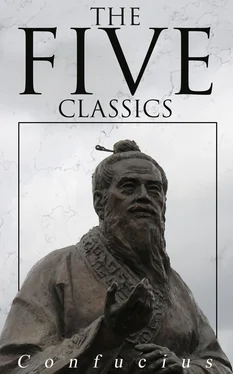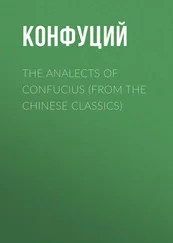How the figure sets forth the state of things by its constituent trigrams will appear in Appendix II. A similar indication is supposed to be given by the lines, not one of which is in the correct place; the strong lines being all in even places, and t he weak lines in odd. At the same time each of them has a proper correlate; and so the figure gives an intimation of some successful progress. See also Appendix I.
The symbolism of the young fox suggests a want of caution on the part of those, in the time and condition denoted by the hexagram, who try to remedy prevailing disorders. Their attempt is not successful, and they get themselves into trouble and danger. Whatever can be done must be undertaken in another way.
I suppose a fox to be intended by the symbolism of line 1, bringing that animal on from the Thwan. Some of the commentators understand it of any animal. The line is weak, at the bottom of the trigram of peril, and responds to the strong 4, which is not in its correct place. Its subject attempts to be doing, but finds cause to regret his course.
The subject of line 2, strong, and in the centre, is able to repress himself, and keep back his carriage from advancing and there is good fortune.
The Khang-hsî editors say that it is very difficult to understand what is said under line 3; and many critics suppose that a negative has dropt out, and that we should really read that 'it will not be advantageous to try and cross the great stream.'
Line 4, though strong, is in an even place; and this might vitiate the endeavours of its subject to bring about a better state of things. But he is firm and correct. He is in the fourth place moreover, and immediately above there is his ruler, represented by a weak line, humble therefore, and prepared to welcome his endeavours. Let him exert himself vigorously and long, as Kâo Ȝung did in his p. 210 famous expedition (see last hexagram, line 3), and he will make progress and have success. Expeditions beyond the frontiers in those days were not very remote. Intercourse was kept up between the army and the court. Rewards, distinctions, and whatever was necessary to encourage the army, were often sent to it.
Line 5 is weak, in an odd place. But its subject is the ruler, humble and supported by the subject of the strong 2; and hence the auspice is very good.
The subject of line 6, when the work of the hexagram has been done, appears disposed to remain quiet in the confidence of his own power, but enjoying himself; and thereby he will do right. If, on the contrary, he will go on to exert his powers, and play with the peril of the situation, the issue will be bad.
Table of Contents
APPENDIX I
Treatise on the Thwan 1, or King Wăn's Explanations of the Entire Hexagrams
Table of Contents
I. 21. Vast is the 'great and originating (power)' indicated by Kh ien! All things owe to it their beginning:--it contains all the meaning belonging to (the name) heaven.
2. The clouds move and the rain is distributed; the various things appear in their developed forms.
3. (The sages) grandly understand (the connexion between) the end and the beginning, and how (the indications of) the six lines (in the hexagram) are accomplished, (each) in its season. (Accordingly) they mount (the carriage) drawn by those six dragons at the proper times, and drive through the sky.
4. The method of Kh ien is to change and transform, so that everything obtains its correct nature as appointed (by the mind of Heaven); and (thereafter the conditions of) great harmony are preserved in union. The result is 'what is advantageous, and correct and firm.
5. (The sage) appears aloft, high above all things, and the myriad states all enjoy repose.
II. 31. Complete is the 'great and originating (capacity)' indicated by Khwăn! All things owe to it their birth;--it receives obediently the influences of Heaven.
2. Khwăn, in its largeness, supports and contains all things. Its excellent capacity matches the unlimited power (of Kh ien). Its comprehension is wide, and its brightness great. The various things obtain (by it) their full development.
3. The mare is a creature of earthly kind. Its (power of) moving on the earth is without limit; it is mild and docile, advantageous and firm:--such is the course of the superior man.
4. 'If he take the initiative, he goes astray:'--he misses, that is, his proper course. 'If he follow,' he is docile, and gets into his regular (course). 'In the south-west he will get friends:'--he will be walking with those of his own class. 'In the north-east he will lose friends:'--but in the end there will be ground for congratulation.
5. 'The good fortune arising from resting in firmness' corresponds to the unlimited capacity of the earth.
III. 41. In Kun we have the strong ( Kh ien) and the weak (Khwăn) commencing their intercourse, and difficulties arising.
2. Movement in the midst of peril gives rise to 'great progress and success, (through) firm correctness.'
3. By the action of the thunder and rain, (which are symbols of K ăn and Khan), all (between heaven and earth) is filled up. But the condition of the time is full of irregularity and obscurity. Feudal princes should be established, but the feeling that rest and peace have been secured should not be indulged (even then).
IV. 51. In Măng we have (the trigram for) a mountain, and below it that of a rugged defile with a stream in it. The conditions of peril and arrest of progress (suggested by these) give (the idea in) Măng.
2. 'Măng indicates that there will be progress and success:'--for there is development at work in it, and its time of action is exactly what is right. 'I do not seek the youthful and inexperienced; he seeks me:'--so does will respond to will. 'When he shows (the sincerity that marks) the first recourse to divination, I instruct him:'--for possessing the qualities of the undivided line and being in the central place, (the subject of the second line thus speaks). 'A second and third application create annoyance, and I do not instruct so as to create annoyance:'--annoyance (he means) to the ignorant.
(The method of dealing with) the young and ignorant is to nourish the correct (nature belonging to them);--this accomplishes the service of the sage.
V. 61. Hsü denotes waiting. (The figure) shows peril in front; but notwithstanding the firmness and strength (indicated by the inner trigram), its subject does not allow himself to be involved (in the dangerous defile);--it is right he should not be straitened or reduced to extremity.
2. When it is said that, 'with the sincerity declared in Hsü, there will be brilliant success, and with firmness there will be good fortune,' this is shown by the position (of the fifth line) in the place assigned by Heaven, and its being the correct position for it, and in the centre. 'It will be advantageous to go through the great stream;'--that is, going forward will be followed by meritorious achievement.
VI. 71. The upper portion of Sung is (the trigram representing) strength, and the lower (that representing) peril. (The coming together of) strength and peril gives (the idea in) Sung.
2. 'Sung intimates how, though there is sincerity in one's contention, he will yet meet with opposition and obstruction; but if he cherish an apprehensive caution, there will be good fortune:'--a strong (line) has come and got the central place (in the lower trigram).
'If he must prosecute the contention to the (bitter) end, there will be evil:'--contention is not a thing to be carried on to extremity.
'It will be advantageous to meet with the great man:'--what he sets a value on is the due mean, and the correct place.
Читать дальше












